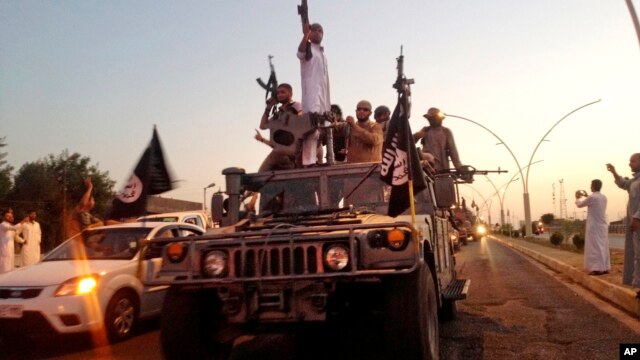
FILE - Fighters from the Islamic State group parade in a commandeered Iraqi security forces armored vehicle down a main road at the northern city of Mosul, Iraq, June 23, 2014.
ROME—
From detailed orders to those who drive cars to instructions for storeowners on how, and to whom, they must display their wares, Islamic State militants have been determined to oversee every aspect of life in territory they control.
Analyst Aymenn Jawad Al-Tamimi of the Middle East Forum, a U.S.-based think tank, has amassed an archive of official IS documents. Collected since the terror group’s rapid expansion in Iraq and Syria, the documents provide a fascinating and frequently horrifying glimpse into the self-proclaimed caliphate, often revealing the militants’ anxieties and obsessions — and, of course, their harshness.
Al-Tamimi began the online archive in January 2015 and has been adding to it ever since.
“The most notable chronological pattern over time has been the attempts to restrict information access and dissemination — that is, information should come out to inhabitants within IS territory and from IS territory to the outside world only via IS-approved channels,” Al-Tamimi told VOA.
“This is evident in Internet access restrictions, warnings to IS members not to open personal accounts, preventing photos of battles being taken by personnel not working in the media departments. And now, most recently, the ban on satellite TV,” he said.
The communications clampdown has endangered anti-IS media activists trying to send out information. In recent months, an IS assassination campaign against media activists has extended from Syria into nearby southern Turkey.
Strict regulations
One order instructs Islamic State followers not to discuss on the Internet news about “the movements of your brothers.” And there are strict regulations on the operation of public Internet cafes.
In some towns, cafes that rent Internet connections to users have been shuttered completely. Those that remain open in Raqqa city, the center of IS activity in Syria, have been ordered to record the identities of all patrons, “except soldiers of the Islamic State and their families.”
No cafes may allow wireless Internet connections outside their premises. Another directive states: “Whoever is found with an Internet connection inside his home, office or any private place will expose himself to severe reckoning.”
A major worry for the militants is the flight of trained medical personnel from major IS-controlled towns in both Syria and Iraq.
An ultimatum issued by militants in Mosul eight months ago — nearly a year after Islamic State fighters captured the Iraqi city — threatened seizure of the property of any medical professionals absent from their jobs for more than 30 days.
Another fixation is on education, and preparing children for the caliphate that IS says it will establish. Many documents in the IS archive deal with changing schools’ curriculum to emphasize the teaching of religion in the classroom.
Prayer, fasting and the observance of religious festivals account for many directives. Orders also detail medieval-style punishments to be meted out for crimes and infringements of the harsh Sharia code IS militants have imposed — including whippings, amputations, stoning and crucifixion.
A thief, for example, must have his right hand cut off and then displayed in public for three days, hanging on his neck, “as recompense for what he has committed.”
Harsher punishments
As IS militants expanded their territory and consolidated their grip, the punishments got harsher. Al-Tamimi notes that “the degree and speed of implementation of Sharia was slower” when IS militants first started to grab territory.
Security is uppermost in the minds of the jihadists. As the bombing campaign by the United States and its coalition partners intensified, more and more security directives were issued.
“Signs stuck to cars of the Islamic State that distinguish them from others are to be removed in light of the ease by which they can be targeted by the enemy,” one edict declares. Bans were announced also on GPS and mobile communications devices.
Travel restrictions stem from both security worries and the fear of a mass exodus of civilians from the so-called caliphate. Women under age 50 are not permitted to travel without an accompanying husband or close male relative.
And the militants demand clear reasons for wanting to travel — from needing medical treatment to collecting Syrian government pensions. Those who are ill can be accompanied by only one other person. All travelers must surrender deeds to their homes and cars as a guarantee that they will return home. |
|
